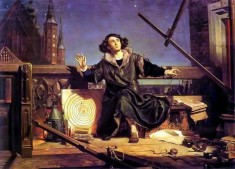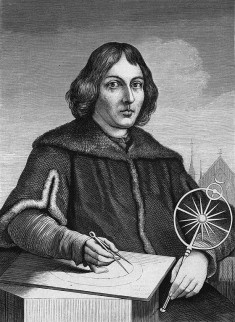Nicolaus Copernicus is among only a handful of men in history who can be said to have fundamentally revolutionized science to such a degree that it also caused wide-reaching changes throughout culture, society, and religion. The works of Copernicus required all of humankind to reevaluate its place in the universe.
Early Years
Nicolaus Copernicus was born in 1473 in what was then the Kingdom of Poland. His Polish nationality has long been the source of considerable national pride for Poland, although in recent years there has been some debate about his true nationality. Some say it is more accurate to consider Copernicus to be of Prussian and/or German descent – or perhaps of both Polish and Germanic background. In general, though, Poland’s claim on his ethnicity is widely accepted as his proper origin.
Copernicus was named after his father, although his father is more often referred to by the Polish version of their name, Mikolaj Kopernik. Mikolaj the Elder, as he was known, was a wealthy copper merchant. It is from “copper” that the Latinized “Copernicus” derives its origin. Mikolaj was also an influential politician. His wife and the mother of Nicolaus was Barbara Watzenrode, the daughter of a politically powerful and well-connected merchant.
Nicolaus was one of four children. Although the fine details of his early life are sketchy, it is certain that Copernicus was a person of extreme intelligence from a very early age. His father died when Nicolaus was about 10 years old, and thus the young Copernicus was largely guided from then on by the highly influential uncle, Lucas Watzenrode the Younger.
The Education of Copernicus
Nicolaus Copernicus received one of the finest educations of his day. He earned a doctorate degree in canon law. However, he was a polyglot who mastered mathematics, several languages, economics, the arts of politics and diplomacy, and even medicine. While he earned the status of “canon” of the Catholic Church, and thus was of the Church clergy, he never took final orders as a priest. Copernicus never married or fathered children.
In the course of his studies, Copernicus became fascinated with the works of the ancients, including Aristotle and Ptolemy. His greatest zeal was for mathematics, astronomy, and cosmology. Copernicus pursued these studies while performing a wide range of other occupations at which he made his living, from acting as secretary personal physician for his powerful uncle to working as an international diplomat and agent for economic and business matters.
The Heliocentric Theory
 While any number of Copernicus’ achievements could have earned him a special place in history — such as his development of the “quantity theory of money” which is still used today — it was his work in astronomy that would transform the world. Copernicus developed the first working model which placed the sun at the center of our solar system, with earth and all the other planets revolving around it. Until Copernicus, the earth was considered not only to be the center of the solar system, but the entire universe.
While any number of Copernicus’ achievements could have earned him a special place in history — such as his development of the “quantity theory of money” which is still used today — it was his work in astronomy that would transform the world. Copernicus developed the first working model which placed the sun at the center of our solar system, with earth and all the other planets revolving around it. Until Copernicus, the earth was considered not only to be the center of the solar system, but the entire universe.
It might be difficult for the average person today to appreciate how powerfully radical the Heliocentric theory of Copernicus was in his time. In fact, the proposition that the sun was at the center of the solar system was such a dangerous idea, Copernicus arranged to have his works published only after his death.
His book, On the Revolutions of the Celestial Spheres, swept away literally thousands of years of beliefs about the fundamental nature of the earth, and thus mankind’s place in the universe.
The book proposes and provides a mathematical working model for a sun-centered solar system. For the first time, the earth was knocked off its pedestal as the center of the universe — a major blow to collective ego of mankind.
The heliocentric theory not only challenged long-held scientific belief, it was also an extreme affront to the Catholic Church. According to the church’s interpretation of cosmology, it was essential that the earth be the center of the universe. To have it any other way was considered heresy and blasphemy. Copernicus could have been imprisoned or even executed for suggesting that the Bible had been wrong about the arrangement of the heavens.
That is why Copernicus withheld publishing his major work until after his death in 1543. He realized that his sun-centered theory would be ridiculed by the scientific community, but also would be violently opposed by the most powerful institution of the day – the Catholic Church. Furthermore, as a clergy member of the Church, Copernicus knew his book could result in his own excommunication.
The Legacy of Copernicus
Once On the Revolutions of the Celestial Spheres was published, however, the legacy of Copernicus was complete, and his book would go on to change the world. About a century later, the great astronomer, Galileo Galilei, would champion Copernican Theory and suffer the threat of execution, imprisonment, and humiliation at the hands of the Church.
Others, such as the philosopher Giordano Bruno, would be burned at the stake for promoting the sun-centered theory. Science finally overtook history, however, and the new model of the universe developed by Nicolaus Copernicus would be accepted, and go on to lay the groundwork for all future development and advancement of the sciences of astronomy and cosmology.
